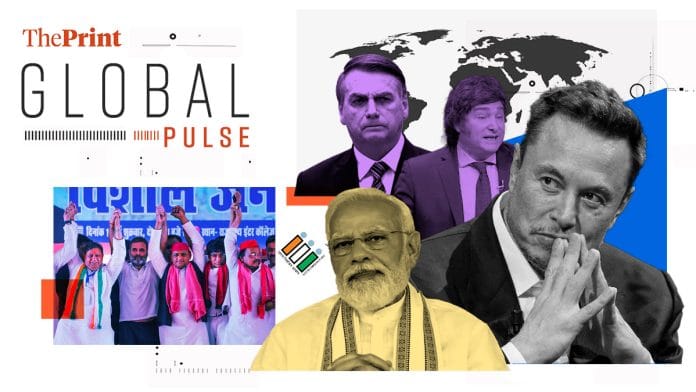New Delhi: Elon Musk’s strategic alliances with right-wing leaders in Argentina, Brazil, and India have been instrumental in securing benefits for his businesses such as Tesla, SpaceX, and X, says a New York Times report, ‘Elon Musk’s Diplomacy: Woo Right-Wing World Leaders. Then Benefit’, by correspondents Ryan Mac, Jack Nicas, and Alex Travelli.
The report says that in Argentina, Musk’s support for President Javier Milei will likely ensure a “stable and potentially cheaper” flow of lithium for Tesla batteries, while in Brazil, his backing of President Jair Bolsonaro resulted in “the opening of a major new market for Starlink“. Meanwhile, Musk’s engagement with Prime Minister Narendra Modi, dating back to 2015, resulted in reduced import tariffs for Tesla vehicles, paving the way for the company’s expansion into the Indian market, adds the report. Coinciding with the tariff reductions benefiting Tesla, Musk advocated for granting India a permanent seat on the UN Security Council in an X post, notes the report.
A Bloomberg article, ‘In bid for survival, India’s opposition tries to work together’, highlights that over 20 opposition parties have united to challenge Modi in this election, with the Congress “taking a backseat to regional parties” in key constituencies. While the Bharatiya Janata Party (BJP) remains “formidable”, the article points out the rising cost of living, unemployment, sentiments against Modi’s dominance, and low voter turnout as challenges for the party. The article gives the example of Maharashtra’s Aurangabad as a city where an Opposition alliance hopes to capitalise on shifting sentiments.
In Foreign Policy’s South Asia Brief, ‘India’s Battleground State’, Michael Kugelman, the director of the South Asia Institute at the Wilson Center, argues how this election is about “by how much” BJP will win after factoring in “inflation” and “opposition to Hindu nationalism”. The writer expounds his theory, taking Karnataka as an example of a “battleground” where the Congress poses a challenge to the BJP. Kugelman says the ruling Congress will benefit from “social welfare pledges” and support from marginalised communities in Karnataka despite it not taking any steps against a hijab ban introduced by the previous BJP government.
‘Will chatbots eat India’s IT industry?’, asks an Economist article on AI, such as ChatGPT, which excels in manipulating numbers and symbols in computer code — a core strength of India’s IT outsourcing sector. The article notes that business services contribute 7% to the GDP and employ five million facing AI impact. However, Indian IT firms, while they were implementing mass layoffs lately, attributed it to tech slowdown, not AI, and foresee the need for “more tech workers, not fewer” in the AI age, the article says.
A New York Times article, ‘At Cannes, Indian Filmmakers Show There Is More Than Just Bollywood‘, highlights that after a 30-year hiatus, an Indian movie, All We Imagine as Light by Payal Kapadia, has entered the Cannes Film Festival main competition for Palme d’Or along with movies by renowned directors Francis Ford Coppola and Yorgos Lanthimos. The article says the movie selection marks a shift towards recognising India’s independent cinema, struggling with domestic funding and market challenges and often overshadowed by mainstream Bollywood hits. It also acknowledges India’s emerging filmmakers at Cannes, according to festival’s artistic director Thierry Frémaux. The article, however, quotes Jio MAMI Mumbai Film Festival artistic director Deepti DCunha as saying, “I don’t think it is that we have recently seen a new wave in talent… It’s more that now Europe is paying attention, or America’s paying attention.”
The Guardian article, ‘Punching up against colonialism is glorious!’ The unstoppable rise of Indian comedy in the UK’, delves into the evolution of stand-up comedy in India and its intersection with the British comedy scene. Highlighting Urooj Ashfaq and Zakir Khan’s success in the UK, the article credits platforms like Soho Theatre for directing the spotlight on Indian comedians, who are currently targeting colonial legacies and bridging gaps despite cultural barriers and government scrutiny.
Sudan reels under war, Russia replaces defence minister
Darfur is on the brink of a disaster as fighting intensifies around El Fasher, the last city in Sudan not controlled by the paramilitary Rapid Support Forces, which initiated a war with the Sudanese armed forces last April. Read The Guardian’s recent to know more.
Russian President Vladimir Putin will replace his long-standing ally Sergei Shoigu as defence minister, announces the Kremlin. Click to know more.
(Edited by Madhurita Goswami)






